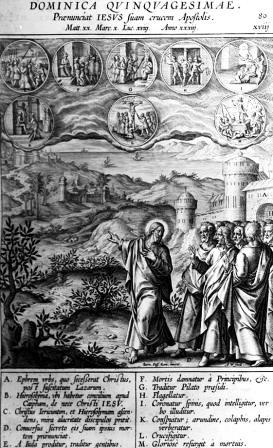QUAERITUR:
My family goes to EF Masses on Sundays most of the time, but Novus Ordo once
a month.My 3-year-old son asked me a question which I have no answer. He asked, “Why is the reading done by people but not the priest?” He asked this because in usus antiquior, the readings must be done by the priest, the assisting sub-deacon, or the clergy in choir. Reading done by laity is a complete novelty for my 3-year-old.
I know it is allowed in the Novus Ordo, but I really could not answer “why” it is allowed. Is there any good reason other than “The spirit of Vatican II allowed active participation”?
Fr. Z responds: Even a 3 year old can see it.
GUEST PRIEST RESPONSE: Fr. Tim Ferguson
In the early Church, there were many liturgical offices, all performed by men in the clerical state. Porters stood guard over the doors of the church, lest non-Christians sneak in. Acolytes attended the major ministers, brought the bread and wine to be consecrated to the priest, and handled the books. Lectors read the lessons and epistles. Cantors or psalmists chanted the psalms. Eventually, by the Middle Ages, a “cursus honorum” had developed with clear steps leading from one office to the next. Young men in the clerical state would be ordained as porters, then, if they showed some competence, they would be ordained as lectors, then acolytes, then exorcists, and ultimately, if they were deemed worthy, they entered into major orders as subdeacons, deacons, and then priests.
The work of one of the minor clerics could always be done by someone in a higher order, since they had been already ordained to that lesser order. Gradually, especially in parish settings, the only one actually ordained was the parish priest. Especially after the invention of seminaries in the 16th centuries, those who were progressing through the minor orders were seldom to be found outside of seminaries and religious houses. Starting by way of exception, men, and eventually boys were permitted to assist the priest after the manner of ordained acolytes, even though they weren’t clerics and, strictly speaking, should not have been allowed to enter into the sanctuary. This exception became the norms in most places. Similarly, the choir, which once would have been composed entirely of clerical chanters, became primarily and often exclusively composed of laymen and even women.
At the time of the Second Vatican Council, some of the Fathers, imbued with the romantic vision of the liturgical movement, hoped to restore the ancient situation with manifold ministers, each performing his specific ministry within the holy Mass. Yet, rather than restore the ancient clerical nature of these ministries, the Council Fathers and their successors in the Vatican, used the contemporary practice of lay people serving in those roles once reserved to ordained acolytes and cantors as a model, and instituted the notion of laymen performing the role anciently reserved to the ordained lector. By the early 1970’s, Pope Paul VI entirely eliminated the vestiges of the ancient ladder of minor orders and the subdiaconate and, in their place, established two new ministries, acolyte and lector, with these ministries being open to laymen. An exception was given by Pope Paul, that these ministries could be fulfilled even by those not formally commissioned to them, and it did not take long in most places for that exception to become the norm.
















 The last time I played yenta for a group of sisters looking for a chaplain, the results were pretty good!
The last time I played yenta for a group of sisters looking for a chaplain, the results were pretty good! 





 For this Ordinary Form calendar Sunday, we have reached the 6th Sunday of Ordinary Time.
For this Ordinary Form calendar Sunday, we have reached the 6th Sunday of Ordinary Time.



 In our traditional Roman calendar, Sunday is Quinquagesima, Latin for the symbolic “Fiftieth” day before Easter. This is one of the pre-Lenten Sundays which prepare us for the discipline of Lent.
In our traditional Roman calendar, Sunday is Quinquagesima, Latin for the symbolic “Fiftieth” day before Easter. This is one of the pre-Lenten Sundays which prepare us for the discipline of Lent.


























